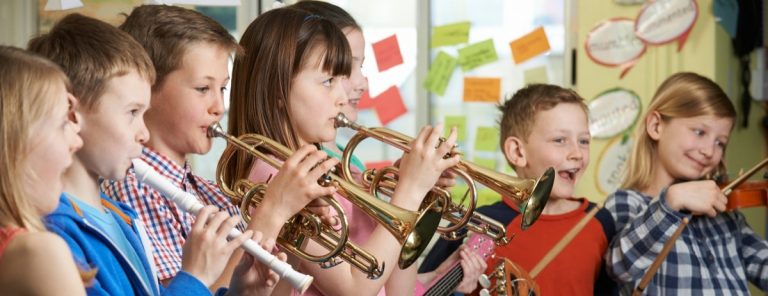
With the constant pressure to improve grades and hit the top marks sought after by top-flight schools across the world, most people reach for a tutor or some form of additional help in maths, science and English – someone to get you up to speed in the subjects that have for so long been considered the core of a “good” education.
But evidence coming from primary schools in the UK – and a number of reports to back them up – suggests we may have been barking up the wrong tree all this time.
One Bradford primary school is seeing the significant benefits of giving children six hours of music education a week. A move that has not only improved children’s general wellbeing and happiness, but boosted grades in all other areas of study.
Seven years ago, Feversham Primary School caught people’s attention for all the wrong reasons. Education watchdog Ofsted had just placed the crisis-hit school in the failing Special Measures category, stating that the school failed to give pupils an acceptable standard of education and warned that it was showing little sign of improvement.
How to improve the school results: not extra maths but #music, loads of it https://t.co/GSCSd7kaM9 @FevershamSchool @GuardianEdu @guardian 🎶
— Feversham Primary (@FevershamSchool) October 3, 2017
But today, that’s all changed. According to The Guardian, Feversham is now rated “good” by Ofsted and is in the top 10 percent nationally for pupil progress in reading, writing and maths. How, you ask?
Well, headteacher Naveed Idrees puts the impressive turnaround, in part, down to the school’s decision to embed music, drama and art into every part of the school day, with up to six hours of music a week for every child.
The approach has had remarkable results. This year 74 percent of its pupils achieved the expected standard in reading, writing and maths, against a national average of 53 percent. It is 7.1 points above the average for reading and 3.4 above for writing. In maths, the school was 2.4 points behind the national average in 2011 and is now 6.5 above it.
While the results appear stunning and surprising, they really shouldn’t. The idea of music helping to boost IQ and lift grades is nothing new.
A study published way back in 2006 in the Journal of Educational Psychology found organised music lessons appear to benefit children’s IQ and academic performance – and the longer the instruction continues, the larger the effect.
“Focus on #music & #creativity to improve #primary results, NOT drilling #SATs papers!” >>> https://t.co/mdqny4MUuZ | @FevershamSchool pic.twitter.com/1TRhcGs0Lm
— CREC (@_CREC) October 3, 2017
Lead researcher E. Glenn Schellenberg of the University of Toronto said, “there is dose-response association,” explaining that in general, the longer a child takes lessons, the higher the IQ and the better the performance in school.
Looking at children from the age of 6 to 11-years-old, and first-year college students, the study found that taking music lessons in childhood was a significant predictor of a higher IQ in young adulthood and a history of better high school grades.
The study involving the younger children found that each additional month of music lessons was accompanied by an increase in IQ of one-sixth of a point, such that six years of lessons was associated with an increase in IQ of 7.5 points, compared with children who did not have the same amount of musical instruction.
For the college students, a history of playing music regularly as children and teenagers had “small but significant” associations with IQ, perceptual organisation, working memory and average high school grades.
So maybe the key to higher grades isn’t late night cramming with that maths textbook after all.
Liked this? Then you’ll love these…
Music at Manchester: An unrivalled blend of academic and performance excellence







